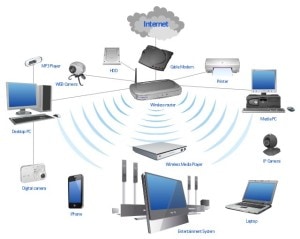What does “putting your business in the cloud” really mean?
You’ve heard the talk, maybe even checked out a few vendors who are “cloud-based” but is the cloud really for you? What are the risks? What does it really mean to be cloud based? We will take you through these topics and more and help you to decipher this mystical thing called “the Cloud!”
First, what is “the cloud”?
The cloud, originally came from the way technical IT drawings denote the internet, perhaps you have seen drawings like this for your own office structure:
What it has become over the last few years is a bit more technical but let’s break it down;
The current cloud –
If you are looking at a program for your company, the vendors you speak to may pontificate about their latest cloud application or speak of monthly “hosting” charge involved for the software. If they speak of cloud and hosting, it is simply that their program is stored on a server that is outside of your office. It can be in their data center or a hosted center where they buy space for their servers. This is the cloud. It is a Server that is physically not at your site that you pay a monthly fee to access.
What isn’t the Cloud?
If your software vendor speaks of hardware and servers that you need to purchase to run and load their software on, this is not the cloud but what is traditionally referred to as a locally hosted application.
What is so great about the cloud then?
The cloud does many things for you;
1. The cloud allows you to access software over the Internet; you do not need to pay for expensive hardware such as servers and workstation upgrades.
2. You also do not need to worry about storage space, servers breaking down, or server upgrades. These are all handled by the cloud provider. If one of their servers goes down, they run redundant servers, this means the server should never have downtime, and you can always get to your data as long as you have an internet connection.
3. It also means you are no longer tied to your office to run most of these applications, you can do so from anyplace that offers internet.
Sounds great, but what about security?
Many people worry about their data being on the internet, however, your cloud vendor/application provider knows they are much more likely to be attacked, thus their security measures are usually very advanced and include things like data encryption, secure passwords and even 2 part authentication. Lets think about that for a moment; in your office, do you use secure passwords? do you use encryption on your data? how about multi-part authentication? the answer to most of these questions i fear is no.
You should also be aware that most of these cloud based applications, if they are of medical, process credit cards or fall under other compliancy regulations, need to meet all of the compliancy requirements as well.
So what about any drawbacks?
– Price can be a factor as the vendor will be charging you a monthly fee instead of a one-time software price, many traditional business owners do not like the idea of not owning the software outright but instead purchasing it on a monthly basis. However, most of the time, when you factor in what it would cost you in hardware and software prices to purchase the same software and put it on your local server, you will find it is cheaper in the long run to pay a monthly fee.
– Internet service can be an issue if your office is physically not capable of getting fast enough service to run the cloud-based application. Many cloud-based apps will require higher speeds depending on the application and the number of users on your network. This is getting better, but it is something to be aware of before you purchase. Check with your ISP (Internet Service Provider) and see what speed you are currently at and what speeds they offer.
So what programs are “cloud-based”?
More and more every day. From CRM (Customer Relationship Management) software to Medical software and even the new Microsoft Office version 365! That is correct, Microsoft’s latest Office software is a combination of local and cloud-based. You can store your files on their cloud (OneDrive) and even access the Office software on the cloud if you wish.
More and more vendors are finding the cloud is the best place to put their software, it allows them to upgrade, install patches and maintain quality control over the environment and provide the best software they can.
For the end user, cloud-based software is becoming more and more convenient and cost effective. In many cases, you may already be using the cloud, and you did not even know it.

